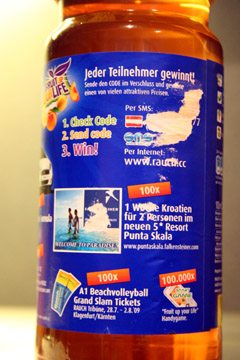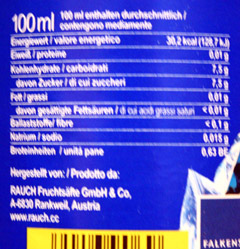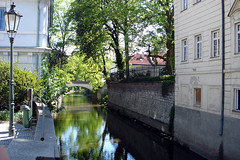 Billa is an Austrian supermarket chain owed by Rewe Group. There are more than one hundred supermarkets in the Czech Republic. And they seem to be selling groceries that are intended for the Austrian (German, Italian or Swiss…) markets – without Czech labels that define ingredients, content specification, expiry dates, etc…
Billa is an Austrian supermarket chain owed by Rewe Group. There are more than one hundred supermarkets in the Czech Republic. And they seem to be selling groceries that are intended for the Austrian (German, Italian or Swiss…) markets – without Czech labels that define ingredients, content specification, expiry dates, etc…
Continuous-update post…
scroll down for newer ones…
The photo on the right is of a bottle of Rauch Ice Tea. First I was surprised to notice (as I was taking it from the shelf) that it would have a German SMS competition on the label but then I remembered that there used to be international shows and the labels displayed the instruction in multiple languages. But no, the label is entirely in German with some Italian pieces of information.
According to the Czech Consumer Protection Act products sold in the Czech Republic must have “instructions” in English. There are some rare exceptions applicable to products in case of which the use is obvious. I can imagine. Hammers, potato peelers and similar tools.
Sec. 9 of act number 634/1992 says:
The vendor is obliged to inform the customer accordingly of the characteristics of a product, its use and maintenance and risks that might arise out of improper use of the product. The vendor can not explain his failure to do so by arguing that the necessary information was not provided to the vendor by the manufacturer, supplier and the like.
And Sec. 11 of the said act says:
The vendor is obliged to make sure that the information referred to in Sec. 9, if provided in a written form, is provided in the Czech language.

Hier brauchen Sie ein Woerterbuch 🙂
Obviously there is some logistic mystery behind the Billa company. This batch was imported directly from Austria with no intermediary company involved. And naturally, the table of ingredients is, again, entirely in German – which I am sure must be a blatant violation of the law (Czech Consumer Protection Act). The “general tips for consumers” provided by the Czech Food Inspection Authority suggest the same.
Not listing the ingredients in Czech might be very dangerous. Of course, people who are allergic do not buy groceries they are unsure about, but there might be customers who assume that they understand what the label says and they may die from a specific form of “overdose” or food poisoning because they are something-intolerant.
UPDATE JUNE 18: I contacted the Czech Food Inspection Authority regarding the potential violation of the Consumer Protection Act. They have fifteen days to “investigate” and let me know… I am thinking of doing a guest-writer article for this weekly news-magazine that I have had professional contacts with…




